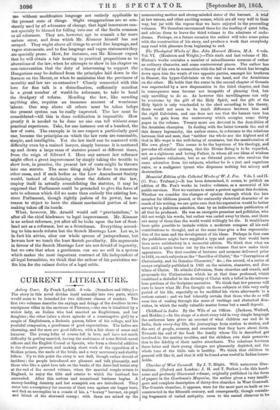CURRENT LITERATURE.
Aubrey Court. By Frank Lyfield. 3 vols. (Saunders and Otley.)— The story in this novel divides itself naturally into two parts, which would seem to be intended for two different classes of readers. The first two volumes describe the sayings and doings of the dwellers in two contiguous villas in the environs of Florence,—the one is inhabited by a widow lady, an Italian who had married an Englishman, and her daughter; the other (after a short episode of a consumptive girl) by a couple of Englishmen, a Bedouin parson, fellow of his college, and his youthful companion, a gentleman of good expectations. The ladies are charming, and the men are good fellows, with a fair share of sense and humour. The young folks of course fall in love, and have not much difficulty in getting married, having the assistance of some British naval officers and the English Consul at Spezzia, who form a cheerful addition to the dramatis persona., and making short work of the opposition of a Sicilian prince, the uncle of the bride, and a very mercenary and shabby fellow. Up to this point the story is not dull, though rather devoid of incident ; the people introduced are pleasant and talk pleasantly, and those who like a quiet love tale on the banks of the Arno had better stop at the end of the second volume, when the married couple return to England, to enjoy the title and estates to which the husband has succeeded. After this serious and sensational business begins. A money-lending dernirep and her scampish son are introduced. They enter into %conspiracy for reasons of their own against our happy hero, and find an accomplice in a cousin of his, a " horsey" baronet, ex-pupil and friend of the aforesaid scamp; with them are mixed up the
manoeuvring mother and strong-minded sister of the baronet. A trial at law ensues, and other exciting scenes, which are all very well in their way, but jar with the repose that we have enjoyed in the proceeding volumes. We therefore recommend these for the reading of quiet folks, and advise them to leave the third volume to the admirers of melo- drama. Perhaps, on a future occasion the author will take some pains with the construction of his story, and produce a work that everybody may read with pleasure from beginning to end.






























 Previous page
Previous page